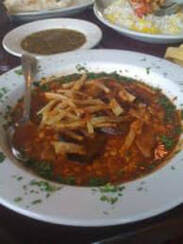 Several posts ago I shared when I first discovered the wonders of Iranian “rice and potatoes”--and how I’ve been relishing it ever since. I also mentioned, just as a side note, the eggplant stew that my future husband had also prepared for me. But making note of the rice dish more than that stew was like favoring a gold band to its diamond companion. It just wasn’t proper. So I’m writing this post to “right” that wrong—and give equal time to that wonderful stew. I remember the impact of that very first bite: a symphony of flavors arresting my mouth: the lamb, the split peas, the crunchy french fries …the tomatoey sauce, just tangy enough. And the eggplant, of course, fried tender and mellow. And it went perfectly with Mahmoud’s rice and potatoes. It was one of those meals when . . . how do they say it? The total effect exceeded the sum of its glorious parts. And from that day forward I kept trying to replicate that stew—a classic dish known in Farsi as khoreshte bademjan. Mahmoud had been faithful to explain what was in it: lamb cooked with onions, split peas and eggplant—and simmered in a sauce laced with salt, pepper, turmeric, tomato paste and lemon. It seemed simple enough—perhaps too simple, I thought to myself. For no matter how often I followed the steps, I could never get my stew as luscious as his was. Surely he’s forgotten to mention something, I figured, and I went on a quest for that missing ingredient--the key to that exquisite melding of flavors. So I turned to my arsenal of “secret ingredients.” I tried garlic. Then curry. Then cayenne pepper. Rosemary and oregano were a serious mistake. When I got desperate, I threw in some sugar—then doused it with teriyaki sauce. When I faced the fact that I couldn’t “improve” it, I finally gave up in exhaustion. When I married Mahmoud and we moved to Tehran, I learned Mahmoud had a family of expert cooks. I grew to love them--and also their cooking. And as much as I loved Mahmoud’s eggplant stew, his sister Badri’s stew was even better. A few months in, when I’d learned enough Farsi, I asked Badri if she would share her secret. Speaking gently and clearly as she always would for me, she listed her requisite set of seasonings: namack (salt), felfel (black pepper), zarchoobeh (turmeric), rohbe goje (tomato paste), limoo (lemon). “And that’s it,” she said, smiling. I was totally baffled. “Are you sure that's all?” I asked her. It was the very same list that Mahmoud had given—the one that had left my stew somehow still lacking. We shared a moment of silence together. A moment later, though, Badri spoke up again—gently, as if she were simply reminding herself. But in her words I discovered the key--and also picked up a new phrase in Farsi: “Leslie Khanum, ghaza boyad yavash-yavash bepaze… ta ghashang ja biafte.” [“Miss Leslie, the food must cook ever so slowly …’til finally it nicely comes into its own.”] “’Til finally it nicely comes into its own” . . . I can still hear the warmth in her voice as she said it. And the more I thought about it, the more it hit me. So--the secret of the stew was in the slow cooking? The principle for me was hardly a new one…but was it one I’d learned to put into practice? I admit it: a side of me was skeptical that simmering a stew over a low flame could really make that much of a difference--particularly without the help of a flavor-enhancer that comes in a bottle. But what did I have to lose (other than the extra time I'd have to wait)? Not long after, I tried for myself. And when I tasted that stew, I loved the outcome--and realized anew that some things are worth waiting for. If you’re interested, I encourage you to make it too. Just click on the link for eggplant stew; it includes all the steps except for the french fry garnish. Be sure to scroll down to read all the comments. And if you would, please let me know how you like it! Since then, I’ve gleaned so much from Badri’s secret—whose wisdom holds true far beyond the kitchen. Where else in life should we take it more slowly--being patient and careful and steadfastly confident ’til finally "it nicely comes into its own”? When watching our diet? Raising our children? Waiting on God to answer our prayers? Or when waiting to publish that very first manuscript? (P.S. So . . . did slow-cooking the stew really make that much difference in flavor? It really, truly did!)
8 Comments
Larissa Bondarchuk
10/5/2021 04:14:12 pm
Hello my dear Leslie,
Reply
Janet Walker
10/5/2021 04:41:13 pm
Hi Leslie
Reply
Leslie
10/8/2021 05:22:22 pm
Hi Janet! What a delicious coincidence! Would have loved to join you and Yas.
Leslie
10/7/2021 09:21:41 pm
Dear Larissa:
Reply
Shelly Bell
10/5/2021 08:54:52 pm
Leslie, what a gentle, mouthwatering and insightful treat this post was! Love that cooking wisdom truly can be applied to
Reply
Leslie
10/8/2021 05:16:08 pm
Thank you, Shelly; I appreciate how the expression applies to life as well—plus the expression has such a nice ring to it!
Reply
lois
10/6/2021 05:33:44 pm
Leslie,
Reply
Leslie
10/8/2021 05:28:58 pm
Thank you so much, Lois. And I’m so glad you’re up to making the stew yourself. Enjoy!
Reply
Leave a Reply. |
AuthorDr. Leslie Ahmadi discovered her intercultural calling in her parents’ home at age four--where between the jazz, the spirituals, and the rock ‘n roll music, she heard folk songs in languages from around the world. Thirty years later she had a doctorate in foreign language and culture education--and her folk song guitar never far away. Archives
July 2024
Categories |

 RSS Feed
RSS Feed